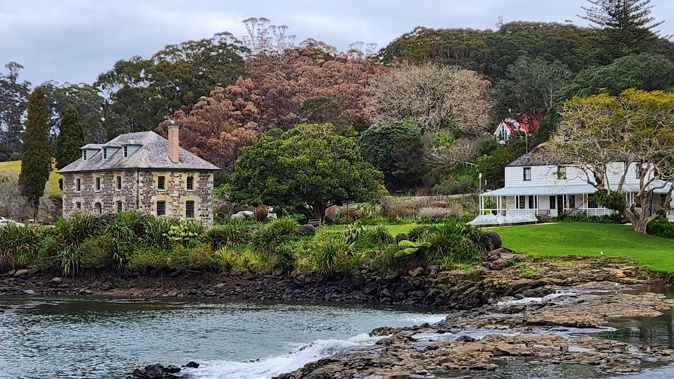
The Northland man who poisoned 50 gum trees near the historic Stone Store in Kerikeri believes he was working “for the good of the community” and stands by his actions to kill the non-indigenous species.
The 68-year-old Kerikeri resident, who the Advocate agreed not to name, said poisoning the trees over a six-month period in the Hongi Hika reserve gave him a real purpose to life after he retired and was diagnosed with cancer.
The gum trees, he said, didn’t belong in the native and historic bush area.
“It’s a bit like seeing rubbish on the road, I thought this was something I could do that I didn’t need to bother anyone else.”
Court documents show in June, Department of Conservation rangers found the man using a cordless drill to make holes in the trees and then inject them with herbicide.
The man’s weed clearing began at the end of 2021, after his retirement and cancer diagnosis.
He began pulling out Taiwan cherry trees along the walking tracks, then progressed to sawing down larger Taiwan cherry trees and painting the stumps with herbicide.
He also cleared other weeds including wild ginger, woolly nightshade, blackberry and gorse.
A year later, post surgery, he decided to commit to his “weed-clearing passion” because he was unsure how long his relatively good health would last.
“Realising that I had 95 per cent of the Taiwan cherry and woolly nightshade cleared ... I deduced that the gums were having the greatest effect on the abilities of the bush to ever regenerate to original indigenous forest.”
The Hongi Hika recreation reserve comprises 16ha of mature exotic eucalyptus trees with an understorey of generating native forest.
The man said he didn’t plan on poisoning all the gum trees, only “two blocks on either side of the walking track down to the bridge”.
Fifty mature eucalyptus trees were drilled and filled with poison over a six-month period by a Kerikeri retiree. Photo / Jenny Ling
The trees are within Kororipo Heritage Park, which includes Kerikeri’s historic Mission Station, the Stone Store, and Ngāpuhi chief Hongi Hika’s pā.
The park is managed by a committee with Ngāti Rēhia, DoC, Far North District Council, and Heritage New Zealand representatives.
Heritage NZ Northland manager Bill Edwards said while the eucalyptus trees were an introduced species, “they do have significance”.
They were introduced by the Rev Samuel Marsden and his missionaries who came to New Zealand from their mission in Parramatta, Sydney, where there were stone buildings and gum trees.
“Marsden and his missionaries wanted to replicate what was in Australia; they had sandstone from Sydney and they brought the trees with them as well.
“They’re an integral part of the basin; they were planted there deliberately and very early on.”
The poisoned trees are within Kororipo Heritage Park, which includes Kerikeri’s historic Mission Station, the Stone Store, and Ngāpuhi chief Hongi Hika’s pā.
DoC initially fined the man $800 for poisoning the mature eucalyptus trees. He disputed the fine and requested a hearing in respect of the alleged offence.
The man appeared in the Kaikohe District Court on November 30, and again on February 29 when he was ordered to pay the $800 fine along with $130 court fees, totalling $930.
Since then, he has paid the fine and come to terms with the consequences when “you do the wrong thing”.
Though the man remains unapologetic about killing the trees, he accepted he was in the wrong by not being authorised by DoC in weed control.
He was sorry the popular Hongi Hika walking track has remained closed to the public. DoC closed the track to keep walkers safe due to the risk of dead trees toppling in high winds.
Court documents show DoC estimates the cost to remove the dying trees, cleaning up and rehabilitating the area to be $15,000 to $30,000.
A DoC spokeswoman said because it decided to issue an infringement notice rather than bring a prosecution, “we did not have the ability to seek any costs for damage done through the court”.
“We have endeavoured to keep the budget required for this to below $10,000.
“Those costs quoted were early in the piece and things have moved since then.”
The case “serves as a reminder of the serious consequences of wilfully damaging or destroying natural habitats”, the spokeswoman said.
“It underscores the importance of respecting conservation laws and the invaluable role of collective efforts in safeguarding our environment.”
Work to fell the dead trees on started on April 15.
Jenny Ling is a news reporter and features writer for the Northern Advocate. She has a special interest in covering roading, lifestyle, business, and animal welfare issues.
This article was originally published on the NZ Herald here.
Take your Radio, Podcasts and Music with you









